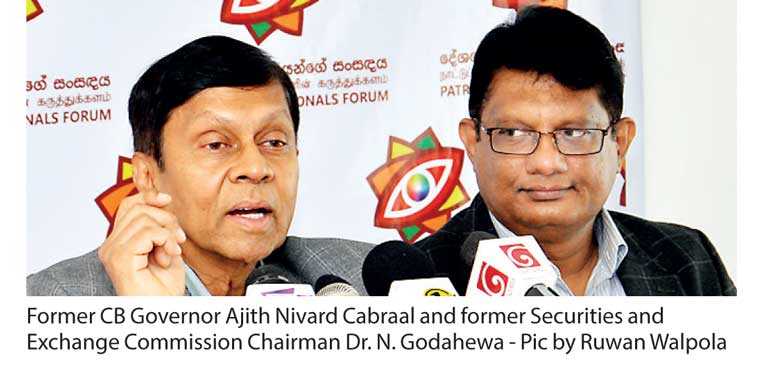Sunday Feb 22, 2026
Sunday Feb 22, 2026
Friday, 4 May 2018 00:00 - - {{hitsCtrl.values.hits}}

By Charumini de Silva
Presenting a different point of view, former Central Bank Governor Ajith Nivard Cabraal yesterday sought to flip the narrative on Sri Lanka’s macro economy, pointing out that debt had continued to increase during the last three years with growth and investment remaining below expectations.
Cabraal, together with former Securities and Exchange Commission (SEC) Chairman Dr. Nalaka Godahewa, contended that the historic high reserves of $ 9.9 billion reported by the Central Bank last month was mostly made up of borrowings as the Coalition Government had limited success in attracting large-scale foreign investment.
“The ratio of debt to GDP has reversed its favourable downward trend from 2010 to 2014 and instead has risen to 77.6% in 2017 from 71.3% in 2014,” he said, adding, “Although a significant increase has been seen in government debt, there seems to be very few infrastructure additions or improvements visible.
Repayments are bound to become more and more challenging in this environment.”
“Total external debt as a percentage of GDP has risen from 53.6% in 2014 to 59.5% in 2017. Foreign investments in Government Securities have been at levels well below the end-2014 levels. Outstanding stock of International Sovereign Bonds has increased to $ 9.65 billion by end-2017,” he added.
He also highlighted that the growth rate of 3.1% recorded last year was the second lowest in 28 years, and the lowest since 2001.
The former officials also noted that the $ 1.9 billion in Foreign Direct Investment (FDI) shown by the Government was mostly earned through the long-term lease of the Hambantota habour, which was constructed during the tenure of former President Mahinda Rajapaksa, with significant big budget projects since 2015 being absent.
“No significant new projects have been added to the pipeline in the three years, 2015 to 2018,” he said.
Dr. Godahewa also highlighted the lack of a streamlined economic policy by the Government, which he claimed has dampened investor confidence.
He pointed out that multiple policy statements released by the Government, with one more to be presented by President Maithripala Sirisena on 8 May, had seen limited implementation with policy inconsistency hobbling economic development.
Cabraal also slammed the current flexible exchange rate policy insisting that it was leading to increased cost of living and stressed that the Central Bank has a “statutory duty” to maintain economic and price stability by intervening in the currency market.
He also rejected explanations provided by National Policies and Economic Affairs State Minister Dr. Harsha de Silva that a competitive rupee would be beneficial for Sri Lanka’s exports, describing him as the “self-proclaimed Economic Guru.”
“In any event, I now firmly believe that it is not possible to convince or attempt to convince these so-called experts, and that is why I decided to apprise the public of the current situation and warn them about the impending dangers,” he said.
Cabraal also censured the Government for missing the 2017 Budget deficit target despite increasing revenue by raising taxes and questioned how the Government was serving the people by subjecting consumers to high levels of taxation.